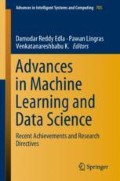Abstract
In the current scenario, it is very difficult for the doctors to diagnose liver patient and there should be some kind of automated support based on machine intelligence that can help to diagnose in advance so that doctors start the treatment faster and save time. The machine intelligence is a way to predict the liver-related problems; in this study, the linear regression is used to predict the same, more accurately. The albumin levels are highly related in diagnosing these kinds of liver problems. The proposed model worked efficiently on 583 observations provided as well as on new datasets. The total average accuracy achieved in this proposed model was 89.34% which is much more than the previously identified research work of Wold et al. (SIAM J Sci Stat Comput, 5(3), 735–743, 1984, [1]) of 84.22%.
Access this chapter
Tax calculation will be finalised at checkout
Purchases are for personal use only
References
Wold, S., et al.: The collinearity problem in linear regression. The partial least squares (PLS) approach to generalized inverses. SIAM J. Sci. Stat. Comput. 5(3), 735–743 (1984)
Uchikawa, T., et al.: Serum albumin levels predict clinical outcomes in chronic kidney disease (CKD) patients undergoing cardiac resynchronization therapy. Intern. Med. 53(6), 555–561 (2014)
Aiken, L.S., Stephen G.W., Steven, C.P.: Multiple linear regression. Handbook of psychology (2003)
Huang, M.-J., Chen, M.-Y., Lee, S.-C.: Integrating data mining with case-based reasoning for chronic diseases prognosis and diagnosis. Expert Syst. Appl. 32(3), 856–867 (2007)
Gupta, S.: Int. J. Comput. Appl. 116(9), 0975–8887 (2015)
Bertsimas, D., King, A.: OR forum—an algorithmic approach to linear regression. Oper. Res. 64(1), 2–16 (2016). https://doi.org/10.1287/opre.2015.1436
Metodološki zvezki, vol. 1, No. 1, pp. 143–161 (2004)
Broadhurst, D., et al.: Genetic algorithms as a method for variable selection in multiple linear regression and partial least squares regression, with applications to pyrolysis mass spectrometry. Anal. Chim. Acta 348(1–3), 71–86 (1997)
Badawi, A.M., Derbala, A.S., Youssef, A.B.M.: Fuzzy logic algorithm for quantitative tissue characterization of diffuse liver diseases from ultrasound images. Int. J. Med. Inform. 55, 135–147 (1999)
Gadaras, I., Mikhailov, L.: An interpretable fuzzy rule-based classification methodology for medical diagnosis. Artif. Intell. Med. 47, 25–41 (2009). Luukka, P.: Fuzzy beans in classification. Expert Syst. Appl. 38, 4798–4801 (2011)
Ming, L.K., Kiong, L.C., Soong, L.W.: Autonomous and deterministic supervised fuzzy clustering with data imputation capabilities. Appl. Soft Comput. 11, 1117–1125 (2011)
Neshat, M., Yaghobi, M., Naghibi, M.B., Esmaelzadeh, A.: Fuzzy expert system design for diagnosis of liver disorders. In: Proceedings of the 2008 International Symposium on Knowledge Acquisition and Modeling KAM 2008, pp. 252–256 (2008)
Breese, J.S., Heckerman, D., Kadie, C. (1998). Empirical analysis of predictive algorithms for collaborative filtering. In Proceedings of UAI-1998: The Fourteenth Conference on Uncertainty in Artificial Intelligence
Burges, C.: A tutorial on support vector machines for pattern recognition. Data Min. Knowl. Discov. 2(2), 955–974 (1998)
CiteSeer: CiteSeer Scientific Digital Library (2002). http://www.citeseer.com
Singh A., et al.: Liver disorder diagnosis using linear, nonlinear and decision tree classification algorithms. IJET 8(5) 2059–2069 (2016)
Qual Quant: Linear versus Logistic Regression vol. 43, pp. 59–74 (2009). https://doi.org/10.1007/s11135-007-9077-3
Fox, J.: Applied Regression Analysis, Linear Models, and Related Methods. Sage Publications, Thou-sand Oaks, CA (1997)
Robbins and Cotran’s Pathologic Basis of Disease, 9th edn.
Hocking, Ronald R.: A biometrics invited paper. The analysis and selection of variables in linear regression. Biometrics 32(1), 1–49 (1976)
Duda, R.O., Hart, P.E.: Pattern Classification and Scene Analysis. Wiley (1973)
Author information
Authors and Affiliations
Corresponding author
Editor information
Editors and Affiliations
Rights and permissions
Copyright information
© 2018 Springer Nature Singapore Pte Ltd.
About this paper
Cite this paper
Garg, D., Sharma, A.K. (2018). Prediction and Analysis of Liver Patient Data Using Linear Regression Technique. In: Reddy Edla, D., Lingras, P., Venkatanareshbabu K. (eds) Advances in Machine Learning and Data Science. Advances in Intelligent Systems and Computing, vol 705. Springer, Singapore. https://doi.org/10.1007/978-981-10-8569-7_8
Download citation
DOI: https://doi.org/10.1007/978-981-10-8569-7_8
Published:
Publisher Name: Springer, Singapore
Print ISBN: 978-981-10-8568-0
Online ISBN: 978-981-10-8569-7
eBook Packages: EngineeringEngineering (R0)

